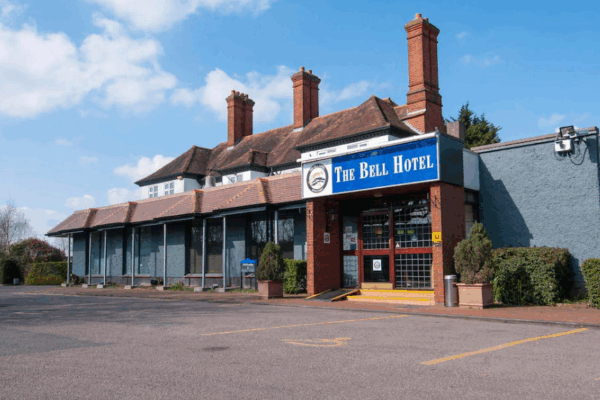What the Epping Forest injunction case means for local authorities across England
Public law & judicial review, Planning & environment, Local government

Author: Jack Barber
On 11 August 2025, Epping Forest District Council as local planning authority applied pursuant to section 187B of the Town and Country Planning Act 1990 for an interim injunction in relation to the Bell Hotel, which is located within the Council’s administrative area. On 19 August 2025, Mr Justice Eyre granted an interim injunction requiring the owners of the Bell Hotel, to stop using, or permitting the use of, that property for accommodating asylum seekers. The judgment was published online earlier today (20 August 2025): Epping Forest District Council v Somani Hotels Ltd [2025] EWHC 2183 (KB).
By section 57(1) TCPA 1990 planning permission is required for the development of land. “Development” for these purposes includes the making of a material change in the use of any buildings or land: see s.55(1) TCPA 1990.
Section 187B materially provides:
“(1) Where a local planning authority consider it necessary or expedient for any actual or apprehended breach of planning control to be restrained by injunction, they may apply to the court for an injunction, whether or not they have exercised or are proposing to exercise any of their other powers under this Part.
(2) On an application under subsection (1) the court may grant such an injunction as the court thinks appropriate for the purpose of restraining the breach.”
A “breach of planning control” is defined in s.171A TCPA 1990 as either carrying out development without the required planning permission or failing to comply with any condition or limitation subject to which planning permission has been granted.
Approach taken by the court
The approach to be taken by the court to an application under section 187B was explained by the House of Lords in South Bucks DC v Porter [2003] UKHL 26, [2003] 2 AC 558 (as summarised at [30]-[35] of the Epping Forest judgment). The s.187B jurisdiction is original, not supervisory (i.e., the court exercises its own discretion to grant or refuse an injunction and does not simply review the local authority’s decision to seek one). The power is discretionary and must be exercised judicially in accordance with the statutory purpose to restrain breaches of planning control where necessary and proportionate. The court must take into account all or any circumstances of the case that bear upon the question of whether the grant would be “just and convenient”. There is a strong general public interest that planning controls should be observed and, if not observed, enforced. However, the achievement of the legitimate aim of preserving the environment does not always outweigh countervailing rights (or factors). Injunctive relief is unlikely to be granted unless it is a commensurate remedy in the particular circumstances. It is the court’s task to strike the balance between the competing interests.
The courts have generally proceeded on the basis that the principles in South Bucks on the use of s.187B are relevant also for decisions on whether to grant interim injunctions; and in American Cyanamid v Ethicon [1975] AC 396 the House of Lords also set out applicable guidelines governing the approach to be taken in relation to an application for an interim injunction. The key principles in American Cyanamid are (i) whether there is a serious issue to be tried; (ii) whether damages would be an adequate remedy; (iii) whether the balance of convenience weighs in favour of or against the grant of an injunction (see also Epping Forest at [39]-[40]).
Other PLA’s pursuing injunctive relief
The Bell Hotel proceedings are not the first example of a local planning authority obtaining injunctive relief pursuant to s.187B of the TCPA 1990 in relation to hotels accommodating asylum seekers.
- In Fenland DC v CBPRP Ltd (2) Serco Ltd (3) H&H North Ltd[2022] EWHC 3132 (KB), the court declined to grant interim relief: there was no evidence of specific risk to asylum seekers in the town; and planning concerns about the use of the property did not outweigh the need for temporary accommodation.
- In Ipswich Borough Council v (1) Fairview Hotels (Ipswich) Ltd (2) Serco Ltd; East Riding of Yorkshire Council v (1) LGH Hotels Management Ltd & Ors[2022] EWHC 2868, it was held that the balance of convenience lay in allowing a use for a hotel for such accommodation to continue to trial, particularly in light of the Home Office’s stated need for temporary accommodation for asylum seekers.
- In Great Yarmouth v Al-Abdin & Ors[2022] EWHC 3476 (KB), the court held that in the “special circumstances” of that case, the factors in favour of continuing an interim injunction outweighed those in favour of discharging it. Relevant factors included “highly specific” protective policies in the local plan; the duration of likely occupation; and the seriousness of likely harm to the local tourist economy (see [50], [55], [63]).
In relation to the first issue on an application for an interim injunction (i.e., whether there is a triable issue), in these sorts of cases, the court will generally be considering whether there is a serious issue to be tried as to whether has been a material change of use such as to amount to a breach of planning control.
In each case, the question of whether the use of a hotel as accommodation for asylum seekers is lawful may depend on two things. First, whether such use is a change from the permitted use (as a hotel). Second, whether such a change is material in planning terms. Both questions are ultimately fact-specific and call for the application of planning judgement to particular circumstances: Epping Forest, [37].
“The Bell is not a hotel for those who are placed there”
In Epping Forest, having considered the various factors supporting or detracting from the view that there had been a change of use, at [101], Eyre J held that the Council’s point that “the Bell is not a hotel for those who are placed there” was a “powerful” one. Numerous factors supported the Council’s contention that the change was a material one, including the nature of on-site changes; the loss of opportunity for use by members of the wider community; and the arguably different contribution made by current occupants to the local community compared with visitors to a hotel:: [102].
The second point on an application for an interim injunction (i.e., whether damages are an adequate remedy) is unlikely to be in issue. In Ipswich, Holgate J (as he then was) doubted whether damages would even be an available remedy. That point was only reiterated in Epping Forest.
On the third issue (whether the balance of convenience supports the grant of interim relief), the judgment in Epping Forest provides further relevant judicial observations. Eyre J held that to be relevant to the balance of convenience as a factor in favour of an injunction a matter must relate to planning harm or to the breach of planning control: [64]. The purpose of having regard to the balance of convenience is to seek to minimise the risk of injustice if a different view of the merits or appropriate course is ultimately taken: [66]. This process is not an arithmetic exercise, but involves looking at matters in the round: [104].
National reports have quoted council leaders describing how the Bell Hotel decision sets a precedent, and numerous other authorities have indicated that they are considering equivalent proceedings.
A word of caution
Eyre J’s decision is a re-statement of a series of relatively well-established principles, applied to the specific facts of a particular case.
It was re-emphasised that the questions of whether a particular use is use as a hotel and whether interim relief is or is not appropriate in a particular caser will be highly fact sensitive; and that there is “simply no general rule” that use of a hotel to house asylum seekers either should or should not be subject to an interim injunction under section 187B: [42].
Common-sense principles
The decision to grant interim relief in this case is not the first example of its kind. It does not indicate a drastic change in how the relevant principles are likely to be applied. Nevertheless, there are some common-sense general points for local authorities concerned with this matter:
- Early dialogue with hotel operators and managing agents might narrow the issues or clarify the factual picture.
- Injunctions are part of authorities’ enforcement tool kits. Decision-makers should consider whether seeking an injunction is necessary and expedient, or whether alternative methods of enforcement are preferable.
- The need for temporary accommodation remains a significant countervailing factor weighing against the grant of interim relief.
- Speed matters, and delay might count against the grant of interim relief.
- There is no “one size fits all” outcome, and the balance of convenience (on which any application is likely to turn) is highly fact-specific.
- Anticipate scrutiny. This area of planning enforcement is politically incendiary. Legal advisers should bear in mind reputational considerations and liaise with communications teams.
Of course, in each case, local authorities will need to consider the available evidence and seek legal advice – urgently if necessary – prior to making an application.
Jack Barber is a planning barrister at Cornerstone Barristers. He has advised various authorities in respect of issues relating to the accommodation of asylum seekers in hotels within their administrative areas. He had no involvement in the Epping Forest District Council proceedings.

